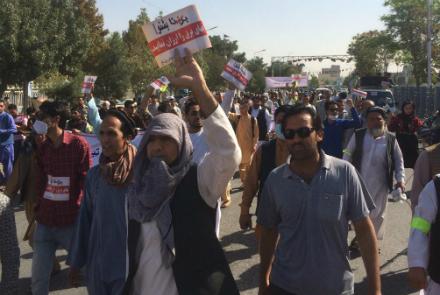Dozens of Balkh residents on Tuesday staged a protest in front of the provincial office of the country’s power distributor Da Afghanistan Breshna Sherkat (DABS) against high electricity bills for consumers, saying they cannot afford the expenses of electricity and that the prices should reduce.=
Publish dateTuesday 15 September 2020 - 15:14
Story Code : 218941
The residents of Mazar-e-Sharif city, the center of Balkh, pay Afs6.25 for one kilowatt of power. The price is Afs2.5 in Kabul. The protestors warned to close DABS office in Balkh if their demands are not met.
“I have Afs7,000 ($90) monthly income, but we receive electricity bills of Afs3,000 ($39) to Afs4,000 ($52) every two months. How can I the expenses of my family with the remaining amount? This is an oppression,” said one protestor Mirwais.
“There are many people in our vicinity who have less than Afs250 ($3) daily income, but their electricity bills are between Afs3,000 ($39) to Afs4,000 ($52),” said Zalmay, a Balkh resident.
The protestors said they shared their complaint with relevant departments several times but their voice “was not heard.”
“We will establish a sit in camp here (in front of the DABS office in Mazar-e-Sharif),” said Bawar Bamik, a protestor. “We will close DABS office in Balkh. Another option is to boycott payment of the bills.”
Echoing the remarks by other protestors, Shazia Haqjo, a Balkh resident, said there are some people whose interests are at danger; therefore, they do not support any plan to reduce electricity prices in the northern province.
DABS officials in Balkh vowed to overcome the issue by implementing a new plan.
“Regarding this issue, DABS decided to adopt an equal tariff standardization of imported electricity throughout Afghanistan,” said Hamidullah Hamidi, head of DABS in Balkh. “The Presidential Palace has also issued a directive regarding this issue.”
Hamidi added that based on a new plan, monthly electricity bills will be distributed to consumers in Balkh.
Statistics by DABS show that Afghanistan pays over $280 million annually to import 670 megawatts of power from Uzbekistan, Tajikistan, Turkmenistan and Iran. Despite the huge expense of imported power, only 35 percent of Afghans have access to electricity, government figures show.

Source : Afghan Voice Agency(AVA)
avapress.net/vdceev8wzjh8zoi.1kbj.html
Tags
Top hits







